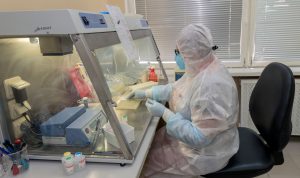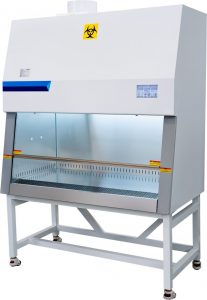Microbiological Safety Cabinets Awareness for Pharmaceutical & Healthcare Sectors

This BOHS Endorsed MBSC Awareness Course is designed to provide delegates with a solid understanding of both managing and using Microbiological Safety Cabinets (MBSCs), with a particular focus on applications within the pharmaceutical and healthcare industries.




Key learning outcomes include:
-
Gaining a fundamental understanding of MBSC functionality in pharma and healthcare, including their varied applications, associated health risks, and the consequences of incorrect specification and use.
-
Learning the essentials of specifying, operating, and maintaining MBSCs, along with an introduction to relevant Hazard Classifications and Containment Levels.
-
Developing knowledge of testing and validation methods, supported by video demonstrations and practical templates such as work instructions, service reports, training aids, and method statements.
-
Receiving a concise introduction to IQ/OQ/PQ processes and the critical design requirements from specification through to site acceptance testing (commissioning).
On successful completion of this BOHS-endorsed course, delegates will receive a digital Course Certificate issued by BOHS.
This one-day program is available either as an in-person course at the East Midlands Hilton Hotel (on J24 M1) or, on selected dates, as a live online webinar.
It can also be run as an in-house course (in which case use the Contact Form to make an enquiry).
Payment is not required at checkout. Invoices will be sent approx 5-6 weeks before the course.
There are no pre-qual requirements to attend this course.
MBSC Awareness Day – Programme
Introduction
- Terms applied to MBSCs and what they mean
- Introduction to Hazard Groups and Containment Levels.
- Where they are used and the question of Operator vs Product Protection
- Applicable legislation (HSAWA 1974), and associated regulatory literature governing Pharma and Healthcare specifically (COSHH, GMP/GxP, HTMs, ISO standards etc)
- Competency i.e., the level of knowledge, skills, experience, and training required to undertake design, testing/validation etc.
Typical Applications in Pharma & Healthcare
- Safety Cabinets (Class I, II & III) EN 12469 (Automation, Hybrid, bespoke cabinets) information on discharge arrangements, thimble, by-pass, recirc or ducted?
- Siting in accordance with BS 5726.
- Multi-branch ductwork systems i.e., where VAV and CAV controlled airflow is applicable, and consideration of the pros & cons surrounding this arrangement.
- HEPA filters, DOP, filter replacement etc?
- Decontamination Methods (VHP, Formaldehyde, Localised strategies)
Hazard Classification
- Chemical Hazard Classification – Occupational Health Categorisation (OHC) definitions and examples of OHC 1, 2, 3, 4 & 5
- Biological Hazard Classification – Hazard Group (HG) definitions and examples of HG1, 2, 3 & 4.
- Lab Containment Levels (CL1 – CL4) and examples of each with a brief overview of the relevant measures and restrictions in place for each level (HSE/ACDP – Management of containment Labs)
- Definitions and requirements under COSHH (e.g. Risk Assessment under Reg 6)
Installation Qualification, Operational Qualification, and Performance Qualification (IQOQPQ) of LEV/Containment devices
- User requirement specification (URS), and User requirement brief (URB)
- Factory Acceptance Test (FAT)
- Installation
- Commissioning or Site Acceptance Test (SAT), third party validation, ensuring relevant documentation is obtained and approved
Maintenance & Checking
- Maintenance Strategies (PPM frequencies)
- Weekly testing checks under COSHH L5
- Testing/inspection/validation and applicability to relevant standards & regulation
- Repairs, modification & part replacement (GxP & Non-GxP Change control etc)
- Understanding of service/validation reports (incl Reg 9 TExT) and discussion of the key information that should be included.
Fees
Course Fee: £595 +VAT/delegate
+ BOHS Certificate Fee: £60 +VAT/delegate





